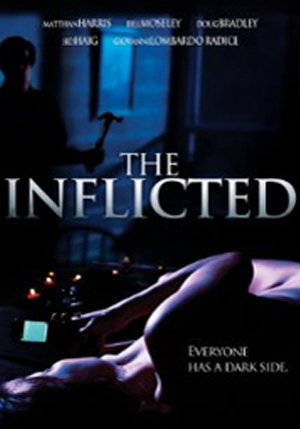
THE INFLICTED
THE INFLICTION
Marco Werba / Kronos records (ltd promo release)
For Mathan Harris’ psychological horror film, Italian composer Marco Werba has composed a beautifully evocative orchestral score. As he did with Dario Argento’s GIALLO, Werba eschews modern trends for scoring horror with sound design, industrial electronica, or massive synthesis, allowing the pure tonality of the orchestra to craft a persuasive psychological portrait of the film’s inflicted psycho killer while harboring some splendid moments of suspect within the realm of symphonic music. Werba’s string writing is especially superb here: the fluidity of the music and the punctuation from the percussion section really gives the music a provocative drive and sinew, and make the album a thoroughly engrossing listening experience. Harris asked Werba for a “suspenseful, psychological, violent classical score that enhanced the emotions of the story,” which the composer provided through a striking use of symphonic melody drawn from the style of Herrmann and others. A couple of themes recur throughout; the investigating police are associated with a bass guitar riff over low, stern string figures. The psychologically inflicted villain is represented by a solo acoustic guitar melody, but one that is only rarely played tenderly; often counterpointed against a jarring reflection of synth (as in “David Meets Kristen”). In “Father And Son,” David’s guitar melody sounds over thick strains of violins who impose a poignant pattern for the killer’s paternal sensitivity, until the cue abruptly shifts into a lament of dour, massed strings. Both elements are reprised in “Final Escape,” a fatalistic musical denouement that resolves the score cheerlessly. David’s brutal acts of violence are often accompanies by recurring downward descents of piano, orchestra, and moaning chorus, but are treated differently on each occasion. “Det. Andrews’ Death introduces the falling glissandi briefly, shifting into morose layers of gloomy strings. In “Kristen is Killed,” each chord structure becomes a rainfall of morbidity as the young woman’s life ebbs away. “Det. Frederick’s Death,” on the other hand, mixed an ascending chord of rising, floating strings, wandering xylophone notes, chilling high violins, while “Prostitute Killing” occurs beneath a wafting resonance of tonal synth echoes, airy and dismal. THE INFLICTION score is rich in instrumental nuances, delicate orientations, and progressive sound patterns that rarely stay the same for very long. Most cues occupy a shifting ground of changing structure, exchanging elements and developing entirely new musical configurations. In “The Fireplace,” for example, Werba creates a journey of sound that covers enormous musical ground in its brief three-minute duration. Opening with a suspenseful miasma of vigorously tremolo strings, he segues into a hushed pattern of violin figures, very pensive and fragmented, until an incursion of lyrical musicbox melody (which, just for the briefest moment, suggests the character of Argento’s SUSPIRIA ostinato before being taken into a different and more delicate direction), coming returning to an aggressive bed of severe violin bowing across which a slow, purposeful cello figure intones, embellished by a rising confluence of synth strings which dissipate, leaving the cello abandoned to resolve alone amidst an airy and desolate reverb. In “The Farm,” a series of plodding synth footsteps are lacerated by a sudden scratch of chorus that is etched across them. Concluding with a “bonus track,” a new arrangement of “The Infliction Theme,” Werba creates a pleasing remix of David’s Theme for sampled horn and synth strings over a compelling and modernistic drum machine beat. The score is thoroughly attractive and interesting, evoking a grim portrait of the disturbed protagonist and creating some captivating orchestral interactions as the music develops across its journey.
Randall Larson
See: www.kronosrecords.com/catalogue.html
